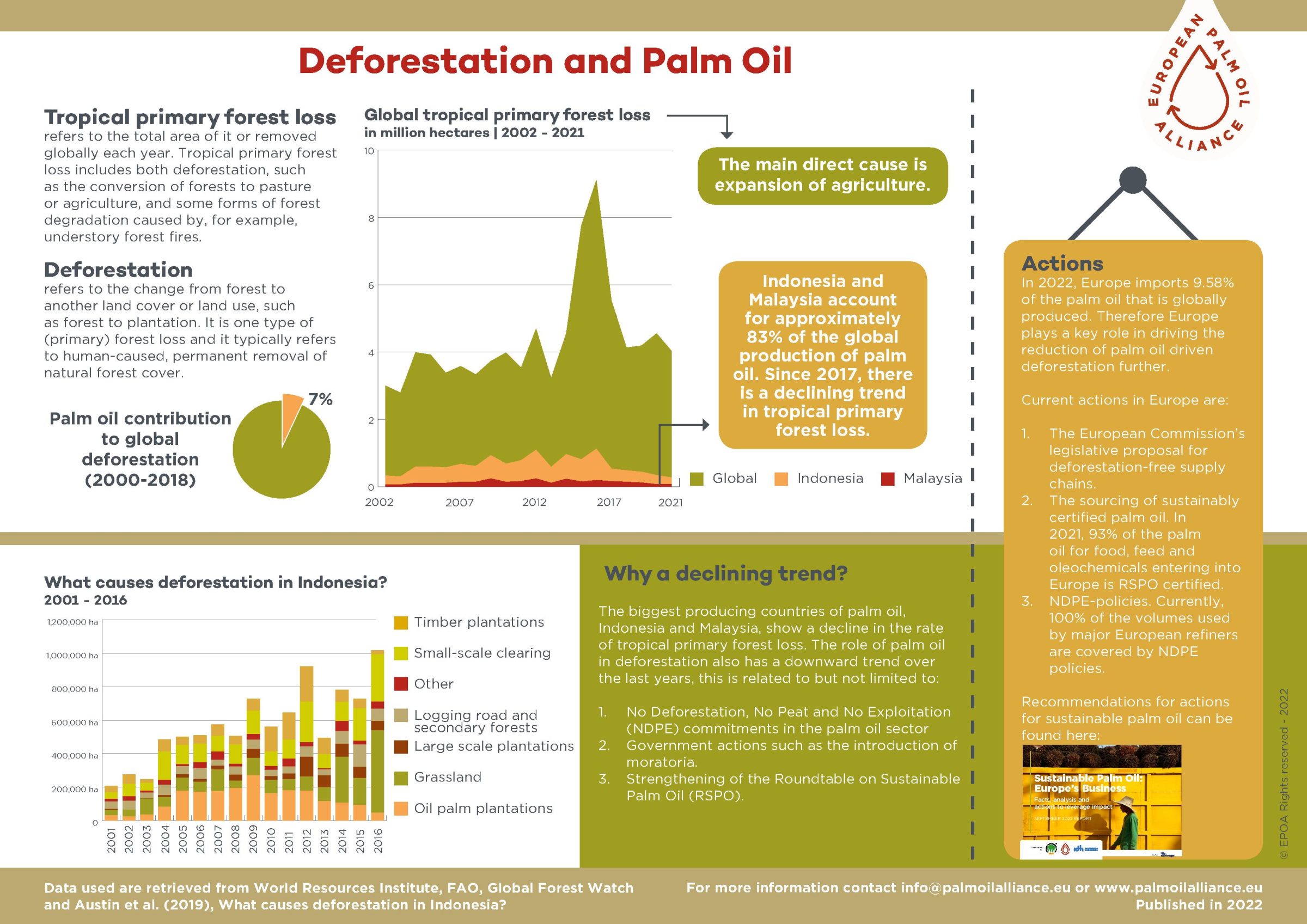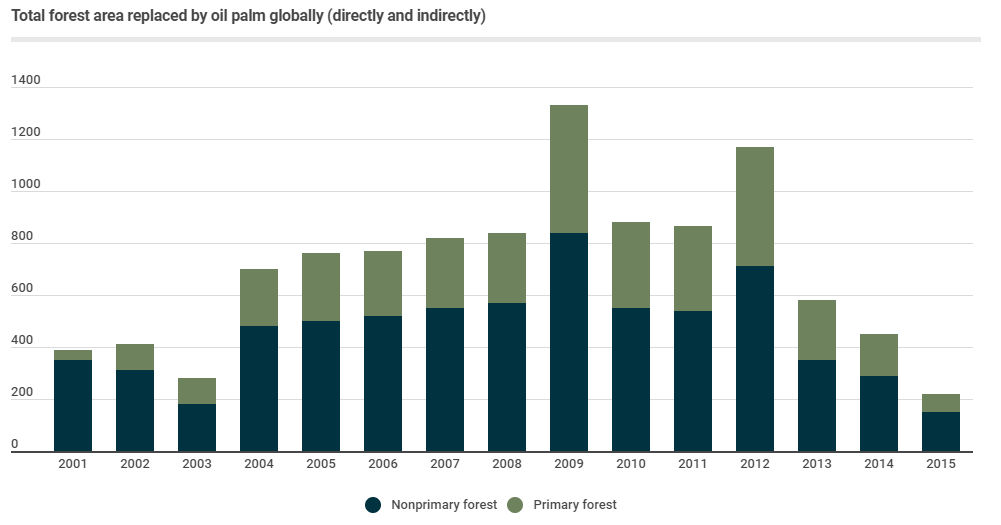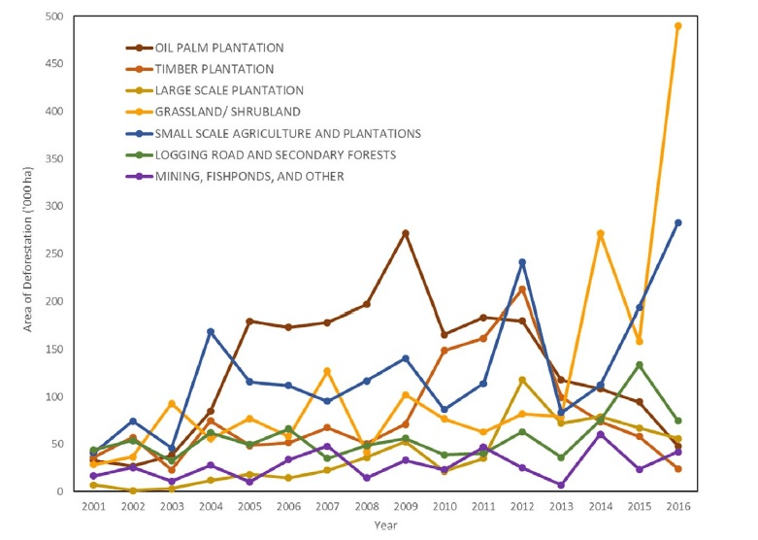Deforestation & Palm Oil
Over the past years, the palm oil industry has introduced different measures to fight deforestation in production areas. Palm oil is one of the many drivers of deforestation. It is, therefore, key to delink the supply chain from deforestation. Find out below more about the relation between palm oil and deforestation.
The relation between palm oil and deforestation
Palm oil plantations have emerged as a significant driver of deforestation, particularly in Southeast Asia. The expansion of oil palm plantations has led to the conversion of vast areas of natural forests into monoculture plantations, resulting in substantial forest loss. This has severe consequences for the environment, biodiversity, and local communities.
The process of establishing palm oil plantations typically involves clearing land by removing existing vegetation, including dense tropical forests. These forests, which are often rich in biodiversity and home to numerous plant and animal species, are irreplaceable natural habitats. The conversion of these forests into oil palm plantations leads to the loss of valuable ecosystems and the destruction of critical wildlife habitats.
Zooming into the role of palm oil in forest loss, FAO data shows, that palm oil has contributed to an estimated 5% of tropical deforestation in tropical areas. When looking at global deforestation, palm oil contributes to 2.3% of global deforestation (The European Commission). A part of this expansion has taken place on land that was previously used for growing other crops like coffee or rubber (The European Commission).

Deforestation and biodiversity
Based on research conducted by the World Wildlife Fund (WWF) and other reputable sources, it is evident that deforestation for palm oil production poses a severe threat to biodiversity, particularly endangering numerous species that rely on forest ecosystems.
The expansion of palm oil plantations leads to the fragmentation and degradation of natural habitats, which have severe implications for wildlife conservation efforts. Forests serve as crucial habitats for a diverse range of plant and animal species, providing food, shelter, and breeding grounds. However, when these forests are cleared to make way for palm oil plantations, the natural habitats become fragmented, isolated, or completely destroyed.
The fragmentation of habitats due to palm oil production disrupts the connectivity between different areas of forests, hindering the movement and dispersal of wildlife. Many species, such as large mammals and birds, require extensive ranges to find sufficient resources and mates. Fragmentation limits their ability to access resources and disrupts the natural ecological balance.
Moreover, the degradation of natural habitats caused by palm oil plantations further compounds the challenges faced by biodiversity. Native vegetation is replaced by monoculture plantations, which offer limited ecological value compared to diverse and complex forest ecosystems. As a result, the availability of food sources, nesting sites, and protective cover for wildlife diminishes significantly.
The impact of palm oil plantations on endangered species is particularly concerning. Many endangered species, including orangutans, tigers, elephants, and rhinos, inhabit forest ecosystems in regions heavily affected by palm oil production. The loss and fragmentation of their habitats pose a severe threat to their survival, pushing them further towards the brink of extinction.
Addressing the impacts of palm oil production on biodiversity requires a multi-faceted approach. It involves promoting sustainable land-use practices, ensuring the protection and restoration of critical habitats, and implementing robust conservation strategies. Collaboration among governments, palm oil companies, local communities, and conservation organizations is essential to effectively mitigate the negative impacts on biodiversity.
Sustainable palm oil RSPO and CSPO
Based on research conducted by the Roundtable on Sustainable Palm Oil (RSPO), the United Nations Environment Programme (UNEP), and other reputable sources, the production of certified sustainable palm oil (CSPO) and the role of the RSPO are essential in promoting sustainable practices within the palm oil industry.
Certified Sustainable Palm Oil (CSPO) is produced in adherence to established environmental and social standards. It is produced in a manner that aims to minimize the negative impacts on the environment, biodiversity, and local communities. CSPO is obtained through a certification process that verifies its compliance with sustainability criteria at every stage of the palm oil supply chain. These criteria include the prohibition of deforestation, protection of wildlife habitats, respect for land rights, and responsible use of resources.
The Roundtable on Sustainable Palm Oil (RSPO) is a global organization that plays a crucial role in promoting sustainable palm oil production and trade. It brings together stakeholders from the palm oil industry, environmental organizations, and social NGOs to develop and implement best practices for sustainable palm oil. The RSPO develops and maintains a set of rigorous sustainability standards for palm oil production, known as the RSPO Principles and Criteria. These standards encompass environmental, social, and economic aspects, ensuring that palm oil production respects the rights of local communities, does not contribute to deforestation, and promotes biodiversity conservation.
The RSPO certification provides assurance that palm oil is produced sustainably. It assures consumers and other stakeholders that the palm oil they use or purchase comes from sources that meet the highest environmental and social standards. RSPO-certified palm oil supports the preservation of forests and wildlife habitats, encourages responsible land-use practices, and promotes the well-being of local communities.
By supporting CSPO and the RSPO certification, stakeholders contribute to the preservation of forests, protection of wildlife, and the sustainable development of palm oil-producing regions. Increased demand for certified sustainable palm oil encourages more producers to adopt sustainable practices, creating a positive market incentive for the industry to improve its environmental and social performance.
Palm oil deforestation continues to decline
In 2022, Chain Reaction Research (CRR) has again identified a decreasing trend for deforestation linked to palm oil. According to its most recent publication on this topic, deforestation linked to palm oil in Indonesia, Malaysia and Papua New Guinea ‘has fallen to its lowest level since 2017’. These countries accounted for 84,2 percent of the global palm oil production in 2020 (EPOA & IDH 2020). This declining trend has also been identified by other organizations, such as WWF and the World Resources Institute (WRI), over the past years.
That this declining trend persists despite the rising prices for palm oil is remarkable. According to experts, deforestation rates are strongly impacted by price changes. These developments show that the link between deforestation and expansion of oil palm plantation can be broken.

Why a slowing trend?
This decline is, according to the WWF and WRI, the result of strengthened law enforcement, moratoria, certification of palm oil plantations and corporate zero-deforestation commitments. Government initiatives in Indonesia and Malaysia introduced in the past years to combat deforestation, such as a permanent moratorium on primary forests and peatland conversion or stricter forest laws.
In addition, corporate actions such as the No Deforestation, No Peat and No Exploitation commitments (NDPE) have been introduced on an increasing scale by the palm oil industry. Likewise, CRR also notes the implementation of NDPE policies and adds COVID-19 related restrictions as possible factors behind this decline in recent years. Finally, certification standards as the RSPO do now include a ban on any deforestation or peat clearing.
Forest fires and deforestation and palm oil
Based on research conducted by the International Union for Conservation of Nature (IUCN) and the United Nations Environment Programme (UNEP), deforestation practices associated with palm oil production, including the use of forest fires to clear land, have significant implications for environmental degradation.
Burning forests to clear land for oil palm plantations contributes to the release of greenhouse gas emissions, primarily carbon dioxide (CO2), into the atmosphere. The combustion of trees and vegetation releases stored carbon, which increases the concentration of CO2, a major driver of climate change. These emissions not only contribute to global warming but also exacerbate the adverse impacts of climate change, such as rising temperatures, changing precipitation patterns, and extreme weather events.
Forest fires used as a method to clear land for palm oil plantations have severe consequences for air quality. The burning of biomass and vegetation releases large amounts of smoke and pollutants into the air, leading to air pollution. These pollutants, including particulate matter and toxic gasses, have detrimental effects on human health, causing respiratory problems and other related illnesses. Moreover, the smoke from forest fires can travel long distances, affecting neighboring communities and even causing regional air pollution.
The loss of forests due to fires associated with palm oil production also results in the destruction of valuable carbon sinks. Forests act as natural carbon sinks, absorbing and storing carbon dioxide through the process of photosynthesis. When forests are burned, not only is the stored carbon released into the atmosphere, but the capacity of the land to sequester carbon is also significantly reduced. This loss of carbon sinks further contributes to the accumulation of CO2 in the atmosphere and exacerbates the impacts of climate change.
By prioritizing sustainable land management practices and adopting responsible approaches to land clearance, stakeholders can mitigate the environmental degradation caused by forest fires associated with palm oil production. This, in turn, contributes to the preservation of ecosystems, reduction of greenhouse gas emissions, and the overall sustainability of the palm oil industry.
Challenges ahead
While deforestation from large scale plantations is declining, deforestation from small scale farmers is increasing. It is crucial to accelerate this slowing trend in industrial plantations and eliminate deforestation. In addition, as outlined by a recent study of the WWF, remaining deforestation in Indonesian Borneo is also associated with pressure from smallholders that do not have zero-deforestation commitments or other voluntary commitments. It is therefore key to ensure that small scale farmers can engage in corporate and government actions to combat deforestation. For more than 3 million small farmers worldwide, palm oil is an important income source. Increasing the socioeconomic benefits while stopping deforestation is key, for example by providing trainings to increase their yield and productivity.
Source: Austin et al. (2019): What causes deforestation in Indonesia?

Toward deforestation-free palm oil
SPOC supports action from governments, companies and NGO’s to fight deforestation. We need further action to accelerate the progress made over the years. Are you interested to learn more about our position in light of the EU Deforestation Regulation? Contact us.
Interested to learn more?
Over the past years, a number of research have been performed to discover the relation between palm oil and deforestation:
Forest Pulse: The latest on the World’s Forest
Eliminating Deforestation from the Production of Agricultural Commodities
The Impacts of Oil Palm on Recent Deforestation and Biodiversity Loss
Oil palm and land use change in Indonesia, Malaysia and Papua New Guinea